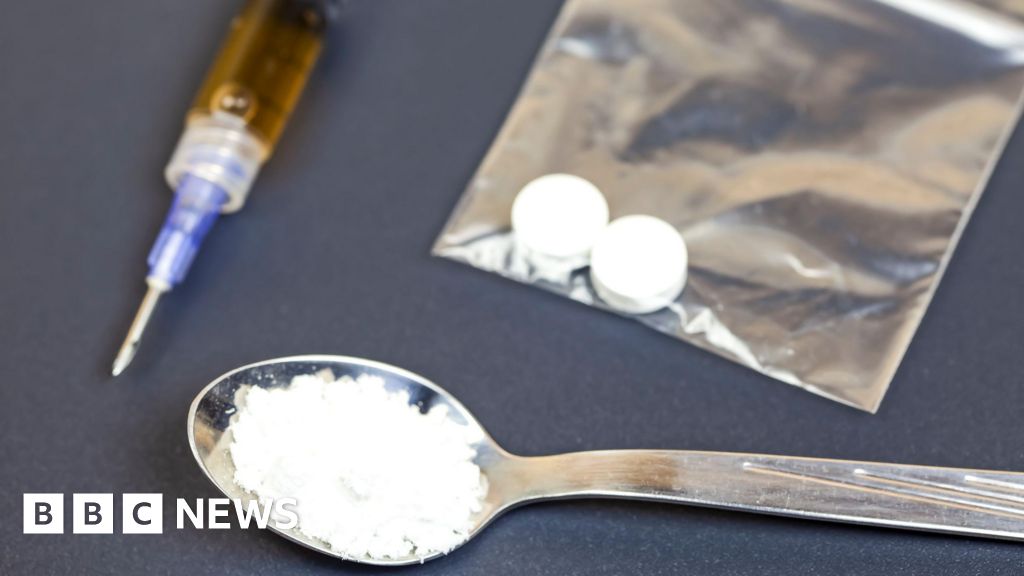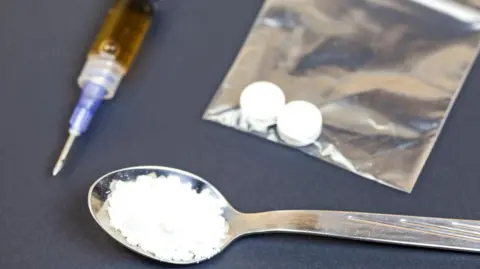Football
Scotland’s drug deaths still worst in Europe after 12% rise

 Getty Images
Getty ImagesThe number of people who died due to drug misuse in Scotland has risen sharply.
National Records of Scotland (NRS) data for 2023 revealed that 1,172 people died – up 121 on the previous 12 months, which represents a 12% increase.
The figures, however, are the second lowest number of drug misuse deaths since 2017.
The Scottish government said the level of drug misuse deaths in the country remained “hugely concerning”.
The increase follows the first significant drop in fatalities in several years in 2022 when there were 1,051 drug-related deaths, at the time seen as an early sign that progress was finally being made.
But the latest figures remain far higher than the 244 deaths in 1996 when comparable records began.
Scotland continues to have a far higher rate of recorded drugs deaths than other European nations, including other parts of the UK.
They are 2.7 times as high as the 2022 rates for England and Northern Ireland, and 2.1 times as high as the 2022 rate in Wales.
Scotland averaged 277 deaths per million people aged 15-64 in 2023.
In comparison, the next highest countries were Estonia with 95 deaths per million people and Norway with 86 deaths per million, according to the most recent data available by the European Union Drugs Agency covering the year 2022.
What type of drugs are involved?
Opiates/opioids – such as heroin, morphine and methadone – were the most common drugs connected to deaths, being implicated in 937 deaths – 80% of the overall total.
The report also confirms psychoactive substances such as benzodiazepines are posing significant dangers.
The number of deaths involving bromazolam rose from 54 in 2022 to 426 last year.
These types of drugs are used to treat anxiety disorders, insomnia and seizures.
Deaths involving synthetic opioids known as nitazenes rose from just one to 23 in 12 months.
There has been a sharp rise in cocaine overdoses with the drug a factor in 479 deaths in 2023 – an increase from 371 deaths in 2022.
NRS says cocaine was a factor in 41% of deaths — up from 6% 15 years ago.
Figures hit a record overall deaths high of 1,339 in 2020.
 Getty Images
Getty ImagesThe data revealed that people living in the most deprived areas of Scotland were more than 15 times as likely to die from drug misuse than in the least deprived areas, while the age that people die from drug misuse has increased over the past two decades.
Those aged 35-54 were most likely to die from drug misuse in 2023 and men were twice as likely to have a drug misuse death as women.
After adjusting for age, Glasgow and Dundee had the highest rates of drug misuse deaths while East Renfrewshire and East Dunbartonshire had the lowest.
The rate of drug misuse death was also above the Scottish average in Inverclyde, North Ayrshire, West Dunbartonshire, East Ayrshire, Renfrewshire and North Lanarkshire.
Scottish Conservatives leader Douglas Ross called the new data “shocking and shameful” and said that drug deaths were the country’s “national shame.”
He said: “These awful statistics highlight yet again the urgent need for John Swinney and the SNP government to finally give their backing to the Right to Recovery Bill.”
Scottish Liberal Democrats leader Alex Cole-Hamilton said the “devastating news” should prompt the Scottish government to strengthen frontline services and introduce new drug checking facilities, while Gillian Mackay of the Scottish Greens said the “root causes” of drug addiction needed to be targeted.
The Scottish government’s health secretary Neil Gray told BBC Scotland News that the amount of drug deaths was “unacceptable” and there was a “recognition” in government that more needed to be done.
He said: “It’s a very complex picture. There is no escaping the fact that the drug death pictures are profoundly worse here than in other parts of the UK, and indeed in other parts of Europe.
“I take responsibility for that. We can also see from other countries that have embarked on a public health journey, like Portugal, that where there is investment in the likes of safer consumption rooms then you can make a difference.”
Mr Gray cited safer consumption rooms in parts of the country and more drug-testing facilities as being part of the Scottish government’s plans to improve the situation.











